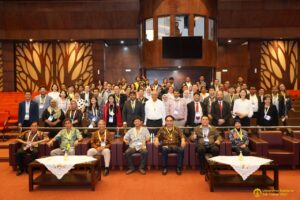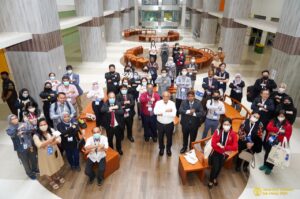
On the last day of QS Higher Ed Summit: Asia Pacific 2022 which was held in Jakarta with Universitas Indonesia (UI) as the host, UI Vice Chancellor for Academic and Student Affairs, Prof. Dr. rer. nat. Abdul Haris, M.Sc., in his closing remarksfor representing UI, expressed high appreciation for the full participation and strong commitment of the delegates to attend the conference. “It is an honor for us in the three days of the event which were full of discussions and sharing benefits. Today we mark the end of this event and the beginning of our next step towards the advancement of human resources and higher education in our institution,” he said.
Prof. Haris mentioned that through the discussions that have been carried out and the agreements that have been reached, it is invaluable to develop strategic collaborations and global engagements with transformative impact. “Our goal is to have a greater impact on higher education through regional cooperation, particularly in Asia Pacific, and institutional capacity building,” he said.
According to Prof. Haris, collaboration is a new way of working that can deliver transformative results in the field. This requires the cooperation of all parties to be successful, including university leaders, research networks, faculty and students, as well as the education ecosystem. “It’s time to finish what we started and move in a new direction to make the wishes we’ve heard from every speaker from day one to today come true. It is time to move in a direction that will help us achieve our common goals, to recover together, and to recover stronger,” he said.
On the second day of the conference, Wednesday (9/11), QS Quacquarelli Symonds also released the 2023 QS Asia University Rankings. The results placed UI in the first position in Indonesia. Responding to this achievement, the University Secretary of UI dr. Agustin Kusumayati, M.Sc., Ph.D. was grateful for the results because this was all thanks to the hard work of all parties. It is not only the academic community such as lecturers and students who contribute, but all elements that support UI have a big role in this achievement.
“We are pleased with what was achieved. Our goal is not about ranking, but this university ranking is one of the ways to spur UI to further improve its quality. Through this ranking, we aim to provide the best for students and the community. Thus, the most important thing is that UI can continue to learn and continue to make good commitments on an on going basis,” said dr. Agustin.
The QS Higher Ed Summit Asia Pacific Conference is the biggest discussion event in the world, especially education. Through this conference, according to dr. Agustin, UI actually got a lot of very meaningful lessons. This learning is not only for UI, she continued. Yet, all participants to the conference speakers and even panelists can exchange ideas for the betterment of the world of education. Agustin said, apart from studying, through this meeting UI built networks, collaborated, and got to know each other with other countries.
In one of the discussion panels on the last day, Prof. Ir. Gunawan Tjahjono, M.Arch., Ph.D., as an expert staff from UI GreenMetric, gave his views regarding the role of universities in dealing with climate change. He took lessons from the Baduy community/tribe, Banten province. “From the theories and journals that have been studied at UI, we need to learn to see the world. Learn a different way of life from the Baduy tribe, to reduce/suppress things that are too far from nature related to climate change. The Baduy people are used to walking hundreds of kilometers from their place without wearing shoes and selling natural products from their area, which is honey,” he said.
Furthermore, Prof. Gunawan said that the excessive energy consumption pushed by investors, as well as capitalism, needs to be resolved. “Rethinking (lessons from the Baduy tribe) does not mean returning to being a primitive person. Learn from the local wisdom of the Baduy tribe. This is also in harmony with our ancestors around 150,000-200,000 years ago, who chose to be civilized. It’s like choosing what food to eat, so the Indonesian human jaw looks like this. But now we are getting into systems that are consuming or draining too much of the earth. That is what causes various challenges faced by humans on earth, one of which is climate change,” he said.
On the last day of QS Higher Ed Summit: Asia Pacific 2022, UI invited around 90 participants from various countries in the Asia Pacific region to tour and get to know more about UI Depok campus. Several locations visited were Universitas Indonesia Hospital (RSUI) and the Integrated Creative Engineering Learning Laboratory (i-CELL) of Faculty of Engineering (FT).
These two places were chosen because they are closely related to several topics discussed in QS Higher Ed Summit: Asia Pacific 2022, namely the role of universities in post-pandemic and the Sustainable Development Goals (SDGs). As a teaching hospital, during the pandemic RSUI not only functioned to provide services but also contributed and collaborated in creating innovations that supported the acceleration in handling Covid-19.
In addition, the FTUI i-CELL building has received several awards for its excellence in energy saving systems, ventilation systems, vertical transportation, lighting, air temperature, water-saving fixtures, clean water sources, solar power, and others. This is in line with UI’s commitment to be able to achieve sustainable goals or SDGs.
The trip around UI campus ended with having afternoon tea with Indonesian cuisine at the Convention Center, UI Depok Campus. The building is a place that is usually used for professor inauguration ceremonies, seminars, and other important events both nationally and internationally.




